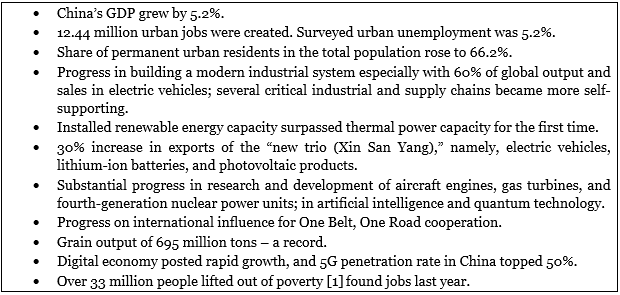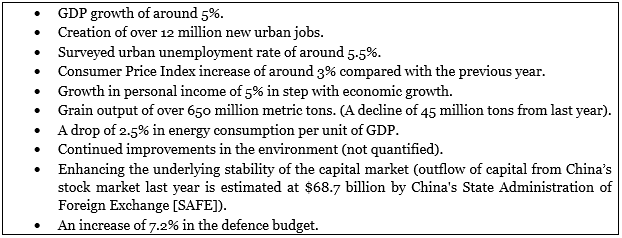The National People’s Congress meeting in China takes place every year in March and this year it was during the week of 4-11 March. It is called Two Sessions (or liang hui in Chinese) as the National People’s Congress and the China People’s Political Consultative Conference take place simultaneously and set the agenda for the year. These are different from the National Congress of the Chinese Party which is held once in five years and is party-centric, electing the committees and approving members of the Politburo.
This year’s Two Sessions saw a couple of departures from the past. One, the premier Li Qiang did not hold the customary press interaction after the Government Work Report (GWR) which he presented on 5 March. Two, the State Organic Law was amended to say that the State Council (the Council of Ministers) will implicitly obey the Communist Party of China (CPC).
The implications of these are important. The premier not interacting with the press may mean that either Li is displaying absolute loyalty to President Xi Jinping, or his importance is being reduced. It will take some time for analysts to figure out which one of them resulted in the skipped media interaction. The State Organic law was amended last in 1982. The present amendment means that the state council will follow the diktat of the CPC and cannot function independently, thereby putting an end to Deng Xiaoping’s policy of separating the state from the party.
These apart, the rest of the meetings were largely as usual. The highlight of the Two Sessions is the Government Work Report which the Premier delivers as a stocktaking of the government’s performance in the past year and sets targets for the coming year.
The 2024 GWR claimed the following achievements:

The targets for the year 2024 came next, and they are mostly about maintaining the status quo. They are as follows:

Most Western analysis concentrated on the cancellation of Premier Li’s press interaction and lack of personnel appointments which are customary in the Two Sessions. There was expectation that Admiral Dong Jun, who is the defence minister, would be appointed to the Central Military Commission and made a State Councillor. Liu Jianchao was expected to be made the foreign minister. Neither was announced. The West also concentrated on the economic woes of China, that even 5% GDP growth will be difficult to achieve. There were passing mentions of other issues like innovation, the lack of change in foreign policy, the importance of the Global Development Initiative, Global Security Initiative and the Global Civilisation Initiative; and stasis in economic policy and invariably the lack of the word “peaceful” while mentioning Taiwan’s Reunification with China and the term “New Productive Forces” etc.
Analysis of the Two Sessions from India mainly followed the pattern of analysis from the West. In addition, in these discussions, there was mention of eight delegates voting against the work report and eight abstaining amongst the approximately 3,000 delegates at the Two Sessions. No surprise: in China such opposing votes are generally orchestrated to show that the process is democratic.
However, from an Indian lens, the following 10 observations are significant.
First is innovation. The Work Report has much emphasis on innovation. The word innovation appeared 31 times in the report as against the word Xi which appeared 24 times. This indicates the importance given to technological advances and innovation.
Second is the mention of the term New Productive Forces. This refers to the greenfield industries in critical and emerging technologies. Xi Jinping articulated the New Productive Forces in the three meetings that he addressed after the Two Sessions. This is of significance as investment in those industries will enable China to leapfrog in technological advancement. In contrast, the term Advanced Productive Forces was used by former President Jiang Zemin when he articulated his signature “Three Represents” in early 2000s. That time it implied the leading industries and businesses in China and their inclusion in the political process.
Third, is the admission in the Work Report of the difficulties that the Xi government is facing – which is unlike most governments where such admissions are rare, if not absent. The admissions were made with regard to the drop in external demand; failure to increase domestic consumption; conduct at the workplace which is burdened by pointless formalities, bureaucratism, hedonism and extravagance; and corruption which is still prevalent despite a sustained crackdown on it for the last decade.
Fourth, is the emphasis on global initiatives launched by China. Though it was mentioned only twice in the report, the emphasis on the Global Development Initiative, Global Security Initiative and Global Civilisation Initiative were visible. Interestingly, the Global Initiative on Data Security was absent in the deliberation
Fifth, is the issue of the third plenum. After the Two Sessions are held in March, a third plenum is held in November where the economic policies are given out. The third plenum after the party congress in March 2023 has not been held so far. This is generally seen as an indication of the economic difficulties that China is facing and therefore the stasis on policies for economic revival in China. It is anybody’s guess if the third plenum will be held anytime soon. Simultaneously there was mention in the GWR for 2024 of deepening reforms and opening up across the board to include reducing market access difficulties for foreign companies and revamping of traditional and emerging industries and cultivating future ones. Unemployment figured prominently in the GWR as did the promotion of equipment upgrades and trade-ins of consumer goods to boost domestic consumption.
Sixth, while Made in China 2025, a concept made public in 2015 to boost manufacturing at home to world-class levels in 10 important sectors did not find a mention, the reference to New Productive Forces and revamping of industries obliquely revealed its importance and progress.
Seventh is a point that all analysts missed. That is the development of border areas. This is significant for India that is locked into a face-off with China for the last four years on the Line of Actual Control in Eastern Ladakh. This, combined with a 7.2% increase in defence budget is important to India. The rate of increase in the defence budget has been delinked from the rate of growth of the Chinese economy. This departure from what was the norm till a few years ago is aimed to enhance China’s military capabilities and increase its overseas influence – particularly in the South China Sea, the India-China border, and elsewhere.
Eighth, an effort to foster growth in biomanufacturing, commercial spaceflight, and the low-altitude economy was mentioned in the GWR, through a combination of funding, research, nurturing of talent, and linking academia, industry and government. China is already one of the leaders in drone manufacturing and there seems to be an effort to consolidate the dominant positioning with an increased self-sufficiency in science and technology. This is expected to accelerate the process of derisking, if not decoupling by China from the dependencies on markets for exports and for raw material imports.
Ninth, expanding the reserve facilities for food, water, resource and energy security for China is mentioned, another move in the direction of derisking China’s economy from the West. The effect of China’s increased imports of soya beans in 2020 led to a spike in prices worldwide, and to food inflation. Oil storage may also be increased in China from the four storage facilities that it has on the eastern seacoast.
Finally, is the issue of Taiwan reunification. While the term “peaceful reunification” was not mentioned in the GWR, it was subsequently mentioned by foreign minister Wang Yi in his media interaction at the time. Therefore, there is no major change in China’s stance towards Taiwan, indicating that for now, China does not want to up the ante on this issue. China called for an equal and orderly multipolar world and a new type of international relations. The meaning and manifestation of these terms will slowly emerge.
In essence, the Two Sessions did not throw up any major surprises. Nor may the Third Plenum and next Two Sessions; but both are necessary to watch.
Lt General SL Narasimhan is Adjunct Distinguished Fellow for National Security and China Studies, Gateway House.
This article was exclusively written for Gateway House: Indian Council on Global Relations. You can read more exclusive content here.
Support our work here.
For permission to republish, please contact outreach@gatewayhouse.in
©Copyright 2024 Gateway House: Indian Council on Global Relations. All rights reserved. Any unauthorised copying or reproduction is strictly prohibited.
References
[1] “Lifting 800 Million People Out of Poverty – New Report Looks at Lessons from China’s Experience,” World Bank, 1 April 2022, https://www.worldbank.org/en/news/press-release/2022/04/01/lifting-800-million-people-out-of-poverty-new-report-looks-at-lessons-from-china-s-experience.


